On View
It’s on Us to Queer the Metaverse: A Digitally Savvy Athens Biennale Tackles the Promises and Pitfalls of Web 3.0
The multi-venue exhibition also looks at our fragile physical existence and the class and racial inequalities affecting it.
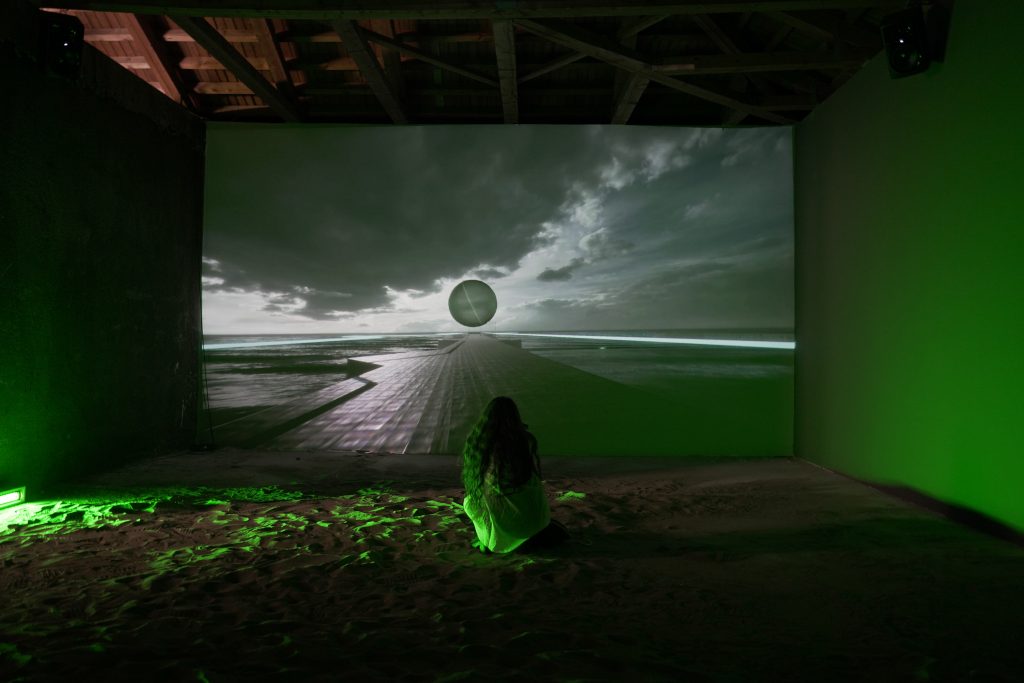
The multi-venue exhibition also looks at our fragile physical existence and the class and racial inequalities affecting it.

Hili Perlson

Of the many era-defining societal shifts and inequities that the Covid-19 pandemic has brought into focus and accelerated, the change in the ways we use and navigate the metaverse are perhaps the least widely recognized and understood. Our dependence on the virtual realm seemed to swell overnight, as those who could moved their work to online rooms, minted NFTs, traded cryptocurrencies, and sent their avatars gaming with like-minded strangers. Only now are we realizing that this version of Web 3.0 being created has the potential to be as grim as the current moment in our physical world: For one, right-wing extremists recruiting and organizing in online quest games has very concrete ramifications in real life.
In his nine-part Metaverse Primer, updated in June 2021 in response to the effects of the pandemic, venture capitalist and former head of strategy for Amazon Matthew Ball offers this definition: “The Metaverse is an expansive network of persistent, real-time rendered 3-D worlds and simulations that support continuity of identity, objects, history, payments, and entitlements, and can be experienced synchronously by an effectively unlimited number of users, each with an individual sense of presence.” Or, to put it in simpler terms, “No one really expected the next generation of the internet would come from mobile gaming, and yet here we are.” That some of the most in-depth writing about this new reality comes from a venture capitalist says it all.
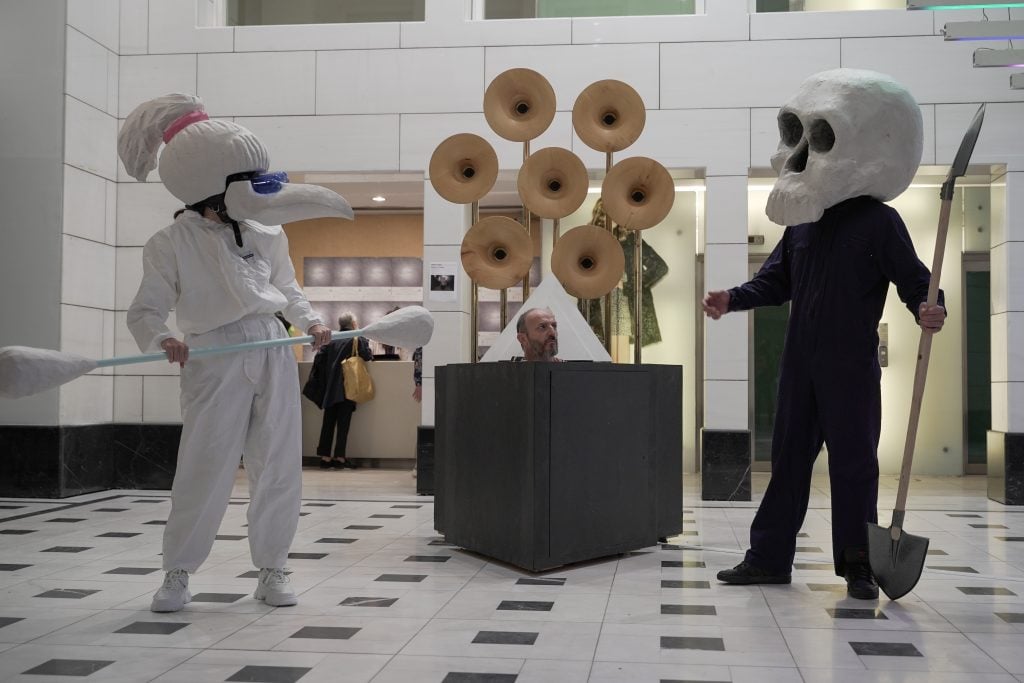
Nektarios Pappas performing The Last Judgement–Reloaded at the 7th Athens Biennale, “ECLIPSE.” Photo: Emilios Charalambous.
“ECLIPSE,” the 7th Athens Biennale (AB7), cocurated by Ghanaian-American curator Larry Ossei-Mensah and Omsk Social Club—a Berlin-based group whose practice is anchored in speculative role-play gaming—under the artistic direction of Poka-Yio, homes in on questions surrounding the utopian promise of Web 3.0. It is up to us, this divergent curatorial team argues, to lay claim, create, meet, build, and thrive in those digital realms. It’s on us to queer the Metaverse.
Fittingly, the list of participating artists includes many individuals and collectives working under pseudonyms and exploring the possibilities of digital practices. Afro-Hungarian artist Huntrezz Janos delivered a digital performance titled Eclipsatrix Exuvia during the biennial’s opening weekend, her bejeweled, chimeric avatar twerking and spinning on a screen inside one of the exhibition’s venues, a former department store. Nascent, a Berlin-based duo founded in 2018, is showing a multipart work titled Temporal Secessionism. A series of digital clocks installed on all floors of the abandoned store, the work keeps track of three different time-measuring systems: one is based on real-time Bitcoin transactions; one shows the consensus of time that syncs all online servers; and another, dubbed “healing time,” moves according to the frequency of broken quartz, the crystal used in analog clockwork. On the 3rd floor, the pseudo-company Hypercomf (brainchild of the Greek artists Ioannis Koliopoulos and Paola Palavidi) has set up an office environment, replete with ergonomic chairs, branded mugs, and indoor plants, and desks made of pressed plastic waste. Some of these elements are coated with organic matter to enable mycelium growth, possibly inviting strands capable of decomposing plastics. Mycelium also happens to be the name of a popular Bitcoin wallet.
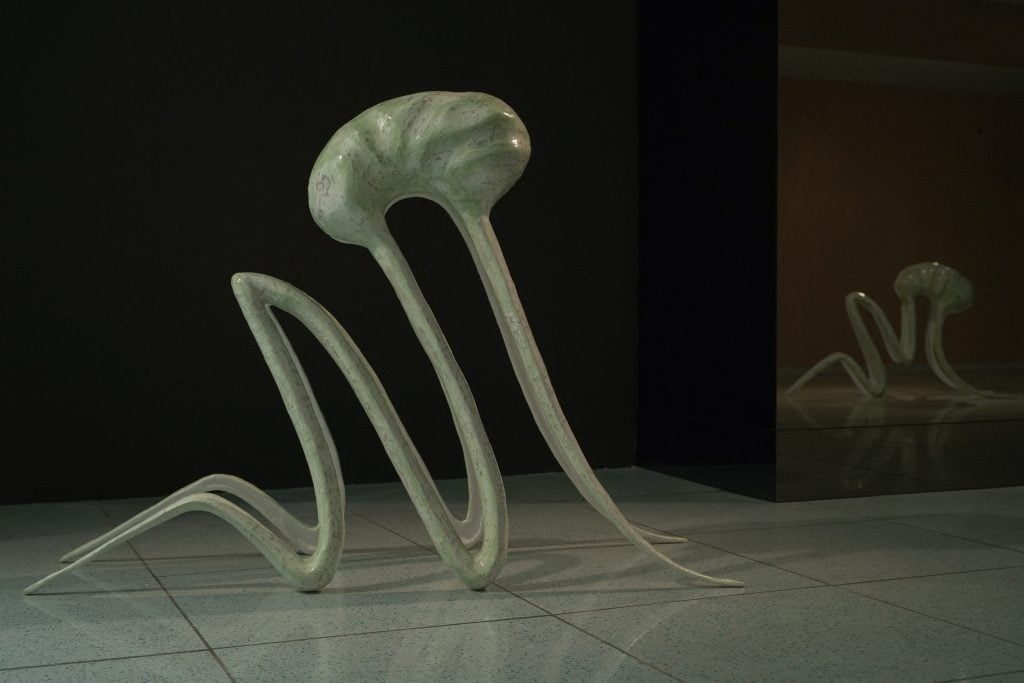
Claude Eigan, Inner Saboteur II (2019), at the 7th Athens Biennale, “ECLIPSE.” Courtesy of the artist. Photo: Emilios Charalambous.
Despite its digital-savvy focus, AB7 also raises issues concerning our fragile physical existence and the class and racial inequalities affecting it. The approach, however, is to address and activate viewers’ tacit and embodied knowledge, rather than beating them over the head with identity politics: the messages are communicated not discursively but instead appeal to viewers’ intuitions surrounding social hierarchies and racial divides. It’s portraiture in lieu of manifestos.
In fact, there is a dazzling amount of photography on view by artists who consider, claim, and reimagine the ways in which to represent nonconforming, disobedient, or other-ed bodies. A series of portraits of members of South-Africa’s LGBTQ community by Zanele Muholi is stunningly straightforward; Kayode Ojo’s glossy portraits are jarring in their rejection of representational tropes, a rallying cry to turn our (luscious, warm) backs on excessive consumerism in favor of a celebration of the unbranded self. Awol Erizku’s still lifes, populated with signifiers of Black culture, are blown up to cover entire walls in what used to be the department store’s sports section.
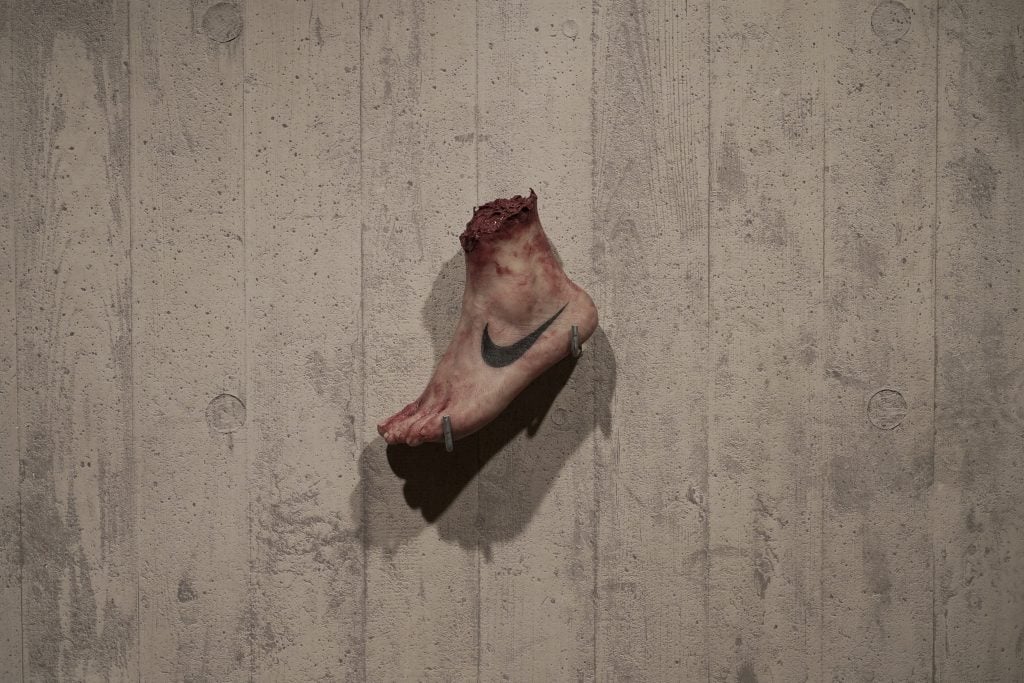
Andrew Roberts, RHYTHM RATTLESNAKE: The world ends with you, baby centipede (2020), at the 7th Athens Biennale, “ECLIPSE.” Photo: Nysos Vasilopoulos.
There are numerous soundscapes and sound installations by artists, including Moor Mother, whose activist spoken-word and protest poetry, which deals with intersectional feminism, inherited trauma, and systemic racism, resonate through the main venue. An installation by the Belgian composer and artist Billy Bultheel, commissioned for AB7, fills the basement of the former Santaroza Courthouse in Dikaiosinis (or Justice) Square, which stood empty for 30 years. The biennial’s organizers initiated the building’s reopening to the public, as well as the cleanup of the small green lung—so scarce in Athens—that the square provides between two main thoroughfares.
Labor and exhaustion was one of the curators’ considerations, too, often implied via its actual remedy—an invitation to take a seat. A series of upcycled chairs made at an Athens workshop, commissioned by London-based designer Yinka Ilori as part of his program for people in addiction recovery, greets viewers on the department store’s first floor. (Ilori has been commissioned by Onassis Culture to design Matala, its vast new cultural center slated to open in 2022 in a diverse neighbourhood of Athens; Onassis Culture is also an important partner of AB7). On the upper level, fantastical animal-headed furniture by Nuri Koerfer invites viewers to pause and sit on the sculptural works.
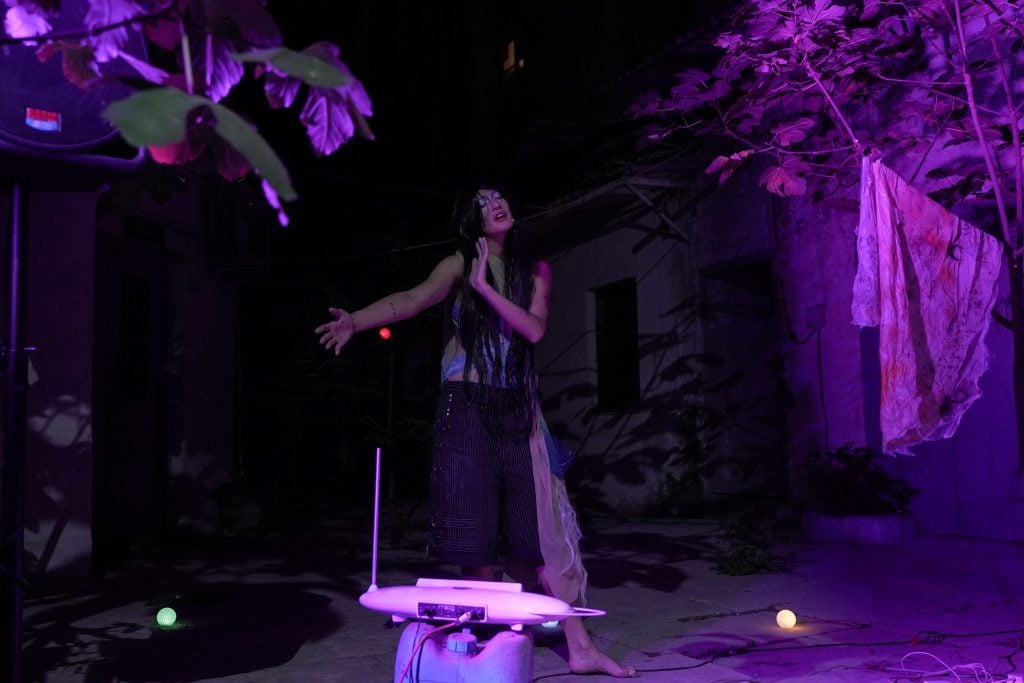
Ayesha Tan Jones performing The New Elementals at the 7th Athens Biennale, “ECLIPSE.” Photo: Nysos Vasilopoulos.
In the biennial’s third venue, an abandoned office building, Miles Greenberg, who’s the youngest artist on view at 22, enthralls with the video work Late October (2021). A protégé of Marina Abramović, Greenberg edited footage from a seven-hour durational performance he staged Paris last year, in which seven Black performers (including himself), each representing a figure from Greek mythology, perch atop slowly revolving plinths. Treating the body as sculptural material, the 20-minute piece speaks of the erosion of both artifacts and empires.
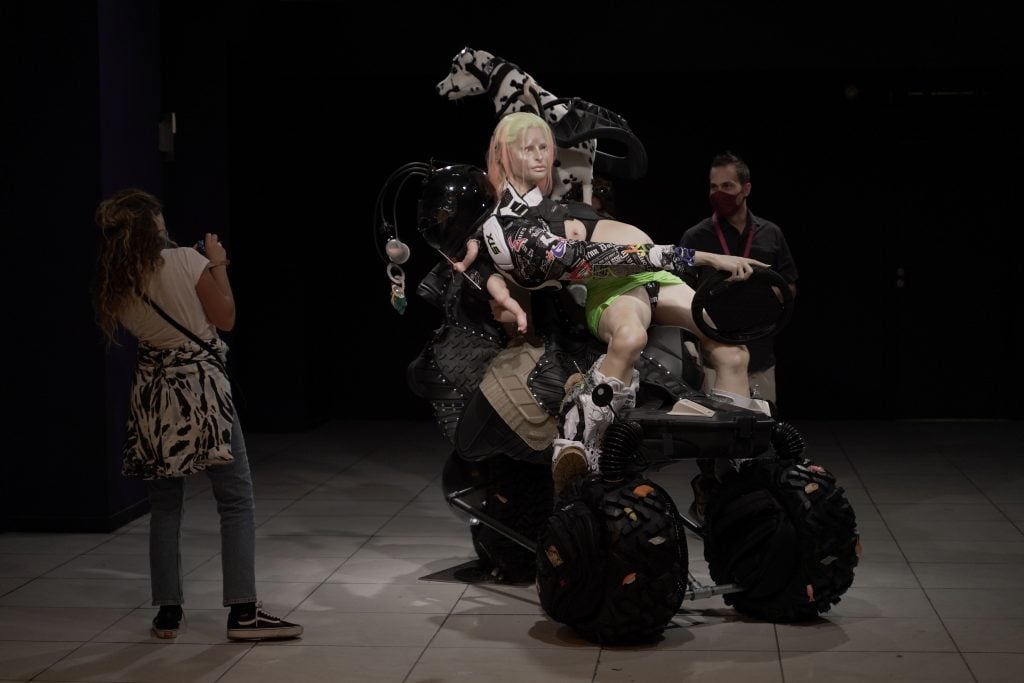
Cajsa von Zeipel, Formula X (2020), at the 7th Athens Biennale, “ECLIPSE.” Courtesy of the artist and Company Gallery. Photo: Nysos Vasilopoulos.
But perhaps no other work captures the oscillation between the two realms we have come to create and exist in than Formula X (2021), a sculpture in silicone, rubber, and steel by Swedish artist Cajsa von Zeipel. Like a Mad Max: Fury Road amazon of the metaverse, a hyper-human pregnant figure is steering a three-wheel ATV into the unknown. Her bags are packed with diapers for her first baby and soon-to-be born second, and treats for her two dogs in tow, everything strapped onto her body or the vehicle with leather and rubber biker gear. The work’s dimensions are larger than life-size, just like the expectations and strain put on single mothers, not only during pandemic lockdowns. She is fierce and in control as she rides over sushi, which lodges between the tracks of the wheels. Or is this a projected avatar emerging from a deeply exhausted human existence?
The seventh Athens Biennale, “ECLIPSE,” is on view at various venues throughout the city, September 24–November 28, 2021.